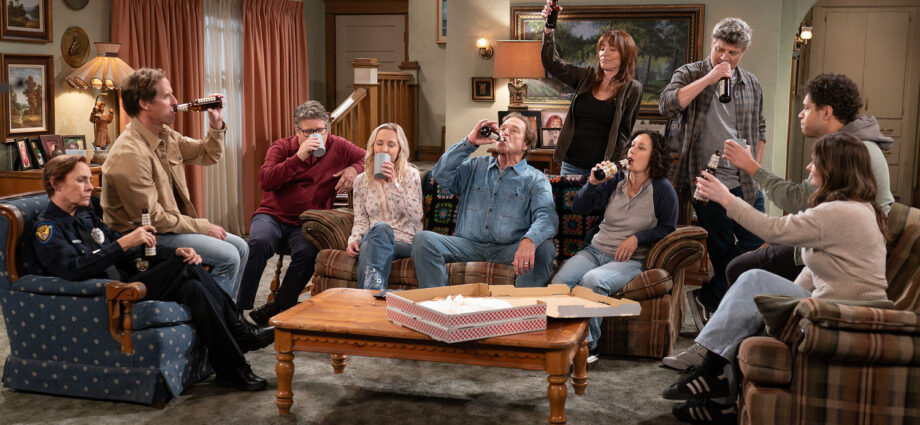ABC broadcast the series finale of “The Conners” on Wednesday, closing out character arcs that began more than 36 years ago with “Roseanne.” When the first run of Roseanne Barr’s eponymous working-class comedy premiered on ABC in 1988, it stood in stark contrast to the prime-time glamour of “Dallas” and “Dynasty,” which then dominated television. Instead of sparkling gowns and champagne-fueled catfights, plots on “Roseanne” involved unpaid electric bills, broken washing machines and kitchen-table spats.
“Roseanne” and “The Conners” had an almost magical ability to speak to the haves and the have-nots.
For many Americans, like the ones I grew up with in Appalachia, “Roseanne” gave us a mirror, instead of an escape. It transformed working-class humor-as-a-survival-tool into a relatable sitcom format. It helped viewers — those seeing themselves for the first time and those seeing others for the first time — grow toward each other.
“Roseanne” and “The Conners” had an almost magical ability to speak to the haves and the have-nots. The shows invited the wealthy to laugh with, not at, working-class struggles, which helped generate empathy. They invited white working-class audiences into progressive conversations from which they may have previously been excluded. Both shows discussed topics including racism, queerness, gender equality, LGBTQ youth, immigration — often characterized as issues for liberal elites or big-city residents — in the language of Lanford, Illinois.
As a kid growing up in rural Kentucky in the 1980s and ‘90s, “Roseanne” introduced conversations I wasn’t having in church or the living room, and I’m not alone among my blue-collar friends in saying that it was “Roseanne” that made me the political progressive I am today. The show made us aware that we, too, should be a part of these conversations, that we were worthy of being taken seriously, and that the issues we associated with others were intimately tied to our lives, as well.
The power of the series to do this work — in its original incarnation, its reboot and in the renamed show after Barr’s character, Roseanne Conner, was killed off — came from its capacity to invite and add. For rural or blue-collar viewers, the show presented new ideas in a world they were comfortable in. For others, the show presented ideas they were already comfortable with but in a world new to them.
The show’s legacy, then, is making progressive ideas digestible to poor and working-class people.
The show’s legacy is making progressive ideas digestible to poor and working-class people.
This legacy may be surprising to some, given Barr’s disappointing evolution. Now a controversial conservative figure, her 2018 reboot was canceled after a racist tweet. (“The Conners” starts after her character on the show has died.) In 2024, Barr released a pro-Trump rap video called “Daddy’s Home.” Those choices should certainly shape how we understand Barr, but they don’t erase the complexity or impact of her earlier work or the original show’s spinoff.
In 2013, when I taught a course on gender and television, I had my students analyze shows using the Bechdel test, which asks only: Are there two women on screen talking about something other than men? It took 50 years of randomized TV episodes before we hit one that passed: “Don’t Ask, Don’t Tell,” a 1994 episode of “Roseanne” that tackled homophobia, performative allyship, gender expression and included a same-sex kiss. Revolutionary doesn’t begin to describe it. The show earned that moment because its viewers trusted the characters. Viewers, at least the ones I knew, felt like they were watching “one of us” — which made room for growth.
Throughout 17 years of the Conners’ lives shown across two series, viewers were watching stories about difficult topics, but “Roseanne” invited them in. It said: You’re a part of this. To the same extent, the show said to Americans quick to dismiss the struggles of the poor and working class: This is how hard life is when you’re living paycheck to paycheck — you, too, are a part of this. No one gets a pass because everyone is included. Few shows have had such political stamina.
In the highly criticized original finale, the Conners win the lottery and live out their wildest dreams, but it’s later revealed to be a story made up by the character Roseanne. “The Conners” echoed the original series’ finale in its final season, with a story arc involving a lawsuit the family filed over the opioid-induced death of Roseanne. Given the scourge of opioids in working-class America, that storyline made sense. This time, though, there is no big payout. In the end, the Conners get a check for only $700, which they use to throw a party with pizza and beer.
Ultimately, this is a more fitting conclusion because there is no magical ending for America’s problems. No lottery win. No glamour and champagne. Just moments of pain and fleeting relief. All we can do is care enough to see our own — and each other’s — stories.
“Roseanne” and “The Conners” gave us just that. One episode at a time.
Willie Carver
Willie Carver is a gay hillbilly writer and poet from Eastern Kentucky. He is the 2022 Kentucky Teacher of the Year and the author of “Gay Poems for Red States.”

